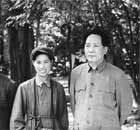Opinion
Scope of 'Chinese model' too wide
By Zhao Qizheng (China Daily)
Updated: 2010-02-04 11:56
 |
Large Medium Small |
Last year, Martin Jacques, a British columnist and academic, published a book named "When China Rules the World" in which he forecasted that China will be the largest economy in the world by 2050. Goldman Sachs made an even bolder projection that China's GDP will be twice as large as the US GDP in 2050. These prophecies, however, are far too optimistic. Even if they are fulfilled, per capita output of China will still be much lower than in the US.
But contrary to the appalling title of his book, Jacques's final conclusion is that China will not rule the world. He believes the rise of China will be the revival of the Chinese culture, and China will resume its position as one of the magnificent civilizations.
China does not have any motive to export the so-called Chinese model. Any developing country, in its development strategy, must account for its own national conditions. The so-called Chinese model is not universally applicable, nor is the development model of any industrialized country.
Comprehensiveness can only be valid when it is subjected to cultural diversity. For instance, fraternity, liberty, peace and democracy are universal values. But for different nations and cultures in different historical stages, specific forms of these values can be quite different.
Francis Fukuyama, the author of The End of History and the Last Man, once believed that the contemporary Western political and economic system is the acme and the finality of human history, and consequently, that history has ended. He did not consider prospective innovations in the Western system, and denied the values of the current and future systems of other countries. Using the Western democracy and free market as the only benchmark, he ignored varied historical and cultural backgrounds of humanity, and rejected the fact that the world is diverse. Therefore, his theory does not stand the test of time.
The Chinese case theory is an ongoing process and will be developed and completed. Though China has achieved a lot, difficulties have mounted, too. Economic growth has pushed China's environment to the brink of collapse. Economic and social development is not balanced between urban and rural areas, and among different regions. The economic structure is too export-driven. Stable development of agriculture and sustainable growth of rural residents' income have become even more difficult. Many problems dealing with employment, the social safety net, income distribution, education, healthcare, judicial justice, public order and others, are yet to be solved. Corruption is still very severe. In face of numerous thorny domestic problems, China will continue to give priority to its internal affairs.
|
||||
For example, in the past China had not participated in the peacekeeping missions of the United Nations. Now China has offered more UN peacekeepers than any other Security Council permanent member. China has increased its engagement in dealing with the global challenges such as climate change, environment pollution, natural disasters, terrorism, cross-border crimes, drug smuggling and epidemics. Perhaps by the middle of this century, when China has become a developed country, it can offer a more profound understanding of the Chinese case and contribute more to the international community.
The author is director of the foreign affairs committee of the National Committee of the Chinese People's Political Consultative Conference. The article was originally published in the latest issue of China Reform.













